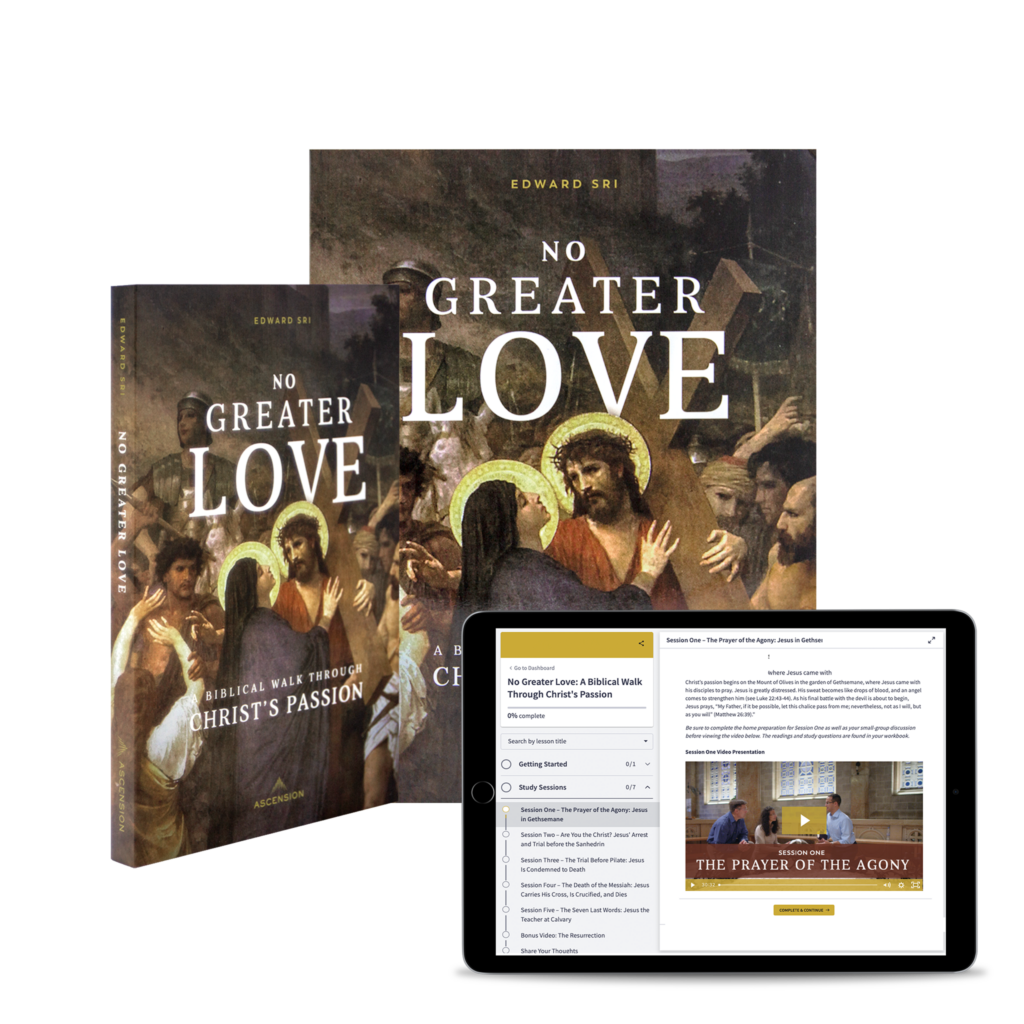Have you ever wondered why Christians described the events leading up to Jesus’ death on Good Friday as “the Passion” of Christ?
Clearly, it is fundamental to our faith. Why would we read the Passion story three times during Holy Week if it wasn’t?
In this article, you will learn the powerful reasons we call Christ’s suffering and redemption of us his passion.
Meaning of the Word “Passion”
The English word “passion” is derived from the Latin word passio. This word means suffering. The expression thus came to describe the afflictions Christ endured for our sins on the last day of his life.
In our modern era, the word has gained an additional meaning. In English, passion can describe an intense feeling or emotion. According to Webster’s dictionary, passion means “a strong feeling of enthusiasm or excitement for something.” Along these lines, people sometimes describe themselves as doing something passionately—with all their heart, with full commitment, drive, and purpose.
“Passion” As True Love
That sense also comes into play as we understand Christ’s determination to give his life for our sins. He is not a passive victim, taken by surprise and forced to endure a horrific death. Jesus said to the Father, “Not my will, but yours, be done” (Luke 22:42). He chose to drink the cup of suffering to the last drop, all for the sake of our salvation.
Pope Benedict XVI takes us even deeper. In his encyclical letter God Is Love, he describes Christ’s passion in the context of passionate love. But here we must be clear: He is not talking about a fallen, human passionate love. That love on its own can be a kind of intoxication in which we are swept away by our emotions, romantic feelings, and sensual desires. Such a love is inward-looking, focusing primarily on one’s own feelings and desires—on what I get from the other person. Such a self-centered love cannot endure.
God does have a passionate love for his people. He is “a lover with all the passion of a true love,” Pope Benedict says. But his passionate love for the human family expresses itself in a higher form of love, expressed by the Greek word agape–a total, committed, sacrificial love. Agape love is outward-looking, seeking what is best for the other person and willing to suffer and sacrifice for that person’s good.
“The Passion” Is Agape Love
Think about how agape love is seen most perfectly in God’s love for us. Even though we turned away from God in sin and even though, according to justice, we have been separated from God and have a debt to pay for our sin, God’s passionate love drove him to become one of us and pay that debt on our behalf. So much did God love us that he did not want us to remain separated from him forever. He sought us. He became one of us and died for us so that we could be reunited with him.
Think of the Passion of Christ as the sufferings Jesus endured for our sins. Think of it as his passionate determination to reconcile us to himself. And with Pope Benedict XVI, think of it as the passion of a lover. God’s passionate love for his people expresses itself as agape, for Jesus loves us so much, he is willing to enter our suffering and sacrifice himself for our sins. And he wants to transform our hearts by this same perfect agape love which he models for us every step of the way from Gethsemane to the Cross.

Will You Follow Jesus to Calvary?
Filmed on location in the Holy Land, No Greater Love: A Biblical Walk Through Christ’s Passion is a pilgrimage that reveals Christ’s amazing love for us. Sign up for a free preview!

Dr. Edward Sri is a theologian, author, FOCUS Vice President of Formation and host of the All Things Catholic Podcast. Learn more about his work at edwardsri.com.






This was a beautiful article. Thank you for sharing it with me. I really felt Jesus’ love for me thru reading it. God bless you.
Thank you very much. That was beautiful.
Great explanation and insights. Thank you for enlightening us with God’s glory and Christ’s passion.
Thank you for explaining the Passion of Christ in detail. I try my best everyday to offer up my whatever I’m suffering as a sacrifice for sinners and their conversion, so the sentence you wrote was beautiful, ‘Agape love is outward-looking, seeking what is best for the other person and willing to suffer and sacrifice for that person’s good.’ Your entire last paragraph filled my heart and soul knowing I don’t just want or have to have God in my life But I NEED God in my life or I’ll just be a lonely empty shell, no heart and soul that will ever feel love or capable of giving love. My Catholic faith means everything to me and I praise Our Lord for allowing me to bare my crosses because I know it pleases Him because I always get closer to Him during my suffering with my trust and faith.